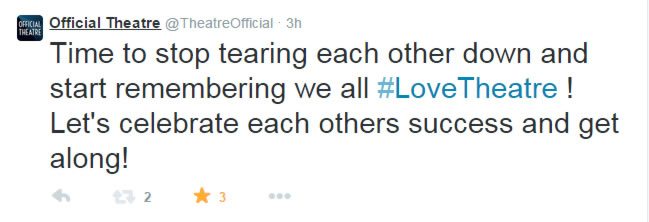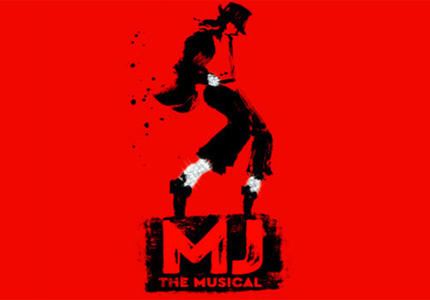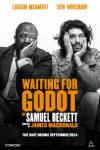Print Vs Online Journalism In Theatre : Who Cares!
OKAY LISTEN. I am sick to my back teeth of the disparaging comments made in the online vs print journalism debate in theatre. For those of you who aren’t aware of the crazy civil war like battle between “online” and “print” journalist, today’s article by Tim Walker in The Guardian is a prime example. If you don’t have time to read it, let me quickly paraphrase. Essentially Tim has been fired by a print publication (which I think we can all agree is sad) and is mourning the loss of his “voice” in print via an online outlet, whilst seemingly damning those who write…er…online. I mean sure.

Like in most wars, the reason for the fighting seems to make little to no sense. I don’t understand why, if we all love theatre, we can’t just get along and celebrate each others thoughts? Or is this, as it sometimes appears, a debate over the freedom that the internet gives to those who wish to write? Surely anyone can be a “critic” if they can see their work published?
In order to make sense of the situation, I have broken down the debate into a few key areas. I would love to hear your thoughts too.
Online vs Print – Why Are You So Afraid?
Listen, I hate to break it to you, but print sales are dwindling. But let’s just for a moment pretend that they are not and that we do not live in the digital age…why are we even pitting the two mediums against each other? Surely they achieve the same thing – they disseminate information to those wishing to consume it. I for one enjoy print publications and online publications side by side. For instance I revel in sitting down with a tea and custard cream on a weekend whilst enjoying a browse of the Sunday papers. Lush. I also sometimes enjoy the freedom of browsing a few different news sites on my lunch break at work, thankful for the choice to save time by not having to spend 10 minutes of it popping to the shop and buying my reading material. BOTH are enjoyable. BOTH can exist, so long as there is a consumer.
Mr Walker’s argument, ironic as it is that he has used an online medium to share it, seems not to be with those who write “online” or those who writes for “papers” but who is actually doing the writing. Tim refers to a “Motley Crew” of “young, spotty” online writers who are, apparently, out of their comfort zone. That’s cute. I wonder how Tim was doing when he was “young” and god forbid “spotty” (didn’t you know that skin clarity has a DIRECT correlation with one’s ability to critique?) My real question is – why are you so afraid?
The beautiful thing about the modern age of tech is that if you like something, you can blooming well tell everyone about it. If you are lucky, some people might start valuing your opinion too! MORE opinions in the pot don’t diminish those already well respected. Walker, and various others we have spoken to on twitter etc, seem to be up in arms about the growing number of online “critics” as they may somehow erase the stripes earned by the older hat. Oh honey, just because a few people wrote some plays after Shakespeare, doesn’t mean we forgot about Romeo and Juliet. Variety is the spice of life and all that! I would bet that Billington still receives credit where credit is due, but it is fabulous that there are other options out there! Just because theatrebunny2014 (fictional) hated a show, doesn’t invalidate the opinions of other critics! If you are lucky enough to have gained a following, then personally I’d work on keeping it, rather than glaring at those also doing well.
The Band Wagon
Okay, so returning to the land where print sales are dwindling… why not just write both for print and online publications?! THEN if you are axed from your printed gig, you have a finger in another pie…it isn’t rocket science! I can only imagine that the days of quill and ink have long since passed and those lucky enough to be paid to write for print publications draft their reviews on a computer? Why not just upload them to a website too? Even the godlike Billington does it, and Tim Walker too for that matter. Mark Shenton, who was dismissed last year from his print job, has found success in diversifying, now writing for online publication LondonTheatre.com as well as continuing his work at The Stage.
If you can earn money doing what you do, then who can afford to be fussy about where it appears? Are we THAT picky? I certainly am not! Yeah, I am paid to write online, but that doesn’t mean I would shun a cheeky little column in a glossy somewhere. Open your minds and hop on the band wagon guys; I promise there is room for you!
Quality and Qualifications : Who Are You Anyway?
One of the main issues that seems to have arisen in this whole debate is quality control; anyone can declare themselves an online critic. Whilst I found this kind of encouraging, Walker (amongst others) seems to have taken great offence at this.
Okay listen; we live in a world of free speech in which we are lead to believe that anything is possible. Sure. But it is not like any esteemed publications (print/online/written in the effing stars or otherwise) THROW their doors open to you. As Walker made it heartbreakingly clear, The Guardian ALREADY has Billington and Charles Spencer was at the Telegraph for 25 years. So what do you want us to do, Tim? Wait for them all to DIE?! I would hope that, just because Jennifer Lawrence is dominating Hollywood and Taylor Swift is ruling the charts, people wouldn’t be disparaged from wanting to act or make music if that is what they want to do! WHAT is the difference between an out of work actor setting up their own theatre company and starting to go it alone, than a person who engages in theatre setting up their own website! Isn’t that how sites like the Guardian began anyway?!
I finished my journalism masters at 21 and applied to every single print publication out there (all offering either unpaid “experience” or £6.20 per hour.) I couldn’t afford to commit to working 9-5 for three months without cash and nobody offered me any paid work in the crucial couple of months I needed it. What was I supposed to do? Give up. Sorry but no. Instead I got on with it, and thus Official Theatre was born. Now, after 3 years of crucial “experience” I wouldn’t want to jump ship and earn minimum wage in the “esteemed” publications.
I am unaware of any other journalist’s qualifications but my own (who actually knows who got what in the GCSE’s, and more importantly who even cares?!) Surely the crucial ingredients here are whether a) someone sees enough theatre to have a basis for comparison as to what equates good and what equates bad and b) whether they are able to communicate their feelings towards a show via which ever medium they choose.
To me it seems screamingly obvious that those who belittle and damn “bloggers” and independent writers are somewhat insecure. I personally think “good on them” for having the time and patience to document their feelings without the certain promise of a cheque at the end of it.
Paid Opinions
So speaking of cheques, presumably this is what the argument is all about? Money right? If not why would anyone care so much?
After years of investment, I make money from Official Theatre. Thank god. There needs to be some kind of trade off for the hours I put in to it vs the remuneration I receive. Whilst it is totally fair for critics, such as Walker, Billington, Gardner and Shenton, to get paid for their efforts, lets not look down on those who do not (yet.)
For the aforementioned journalists, their reward is not only having a valued voice and tickets to the best shows in the country, they also get to pay their bills. Honestly that is fabulous. Those that don’t, however, are doing it for the LOVE. Some make the argument that they do it for the free ticket. Whilst some online writers I know do enjoy the perk of a ticket or two, they also invest their time and money in their websites. They don’t pay their way doing this, they do it simply because they want to.
I am not saying that you shouldn’t trust paid critics, of course you should, that is what they are paid for…but as Walker pointed out in his article, many journalists feel morally conflicted when offered 5 star hotels to stay in when reviewing out of town (!) Let me tell you that many others pay to run for that last train. Doesn’t the fact that some people aren’t receiving anything for their efforts make their views refreshingly trust worthy?! It’s not like they feel the need to appease various producers, PRs etc, they answer only to themselves. Serious respect.
Similarly, there are many ways of monetizing websites and printed ventures. Just because some writers aren’t paid by some kind of godlike higher power for their views, doesn’t mean they do not make money. Some of my favourite blogs, such as BloodyHellBrennan, successfully utilise paid advertising. If she didn’t get the readers, she wouldn’t get the money.
Let the Readers Do The Talking
As I have touched on above, this whole discussion is rendered useless if we “critics,” “journalists and bloggers” or however we chose to brand ourselves remove our readers from the equation. If somebody is a terrible writer, as some online sceptics have been claiming, then I highly doubt that anyone will READ their work. If they do, then boo hoo, they have a market somewhere. Consumers fuel content creation. Simply put; if the discontinued arts sections had the readers and therefore the revenue they wouldn’t have been discontinued. If people read online sites such as West End Frame, West End Wilma, The Arts Desk, SoSoGay, The Public Reviews etc etc then that is because, for better of for worse, people enjoy the opinions expressed. Similarly if somebody wants to start a small site dedicated to their thoughts on something they have experienced then let them. Thankfully this is not a dictatorship. You never know, maybe the person writing could be the next Spencer or Billington. After all, you have to start somewhere. Tim Walker, if you want to gain your readers back, if you want to continue to have a “voice,” I suggest you continue the debate, rather than damning those already in the conversation. I’d also recommend another stroll through theatreland, this time with your eyes open – you might be interested to see whose quotes are knocking around these days.

Essentially; theatre criticism isn’t Middle Earth, so what are we actually fighting for? So long as we remain constructive and fair, I can’t see how including more people in a debate can be a detriment to the topic. When all is said and done, we need to just start co-existing and loving each other for sharing our creativity and thoughts. I would like to extend the welcome to anyone who runs a theatre publication to join us at our next #LDNTheatreBloggers meet up and share the love with us!













